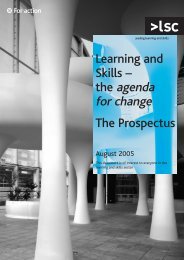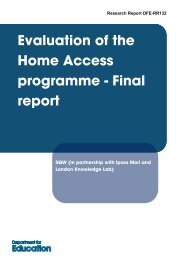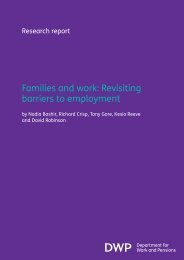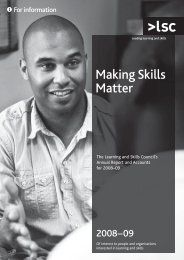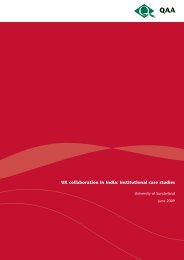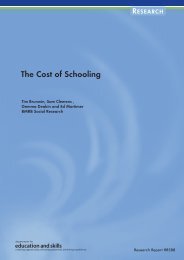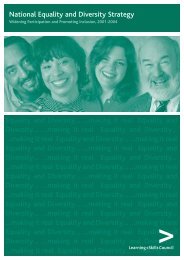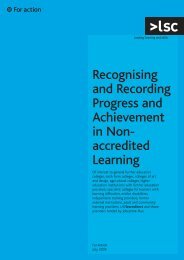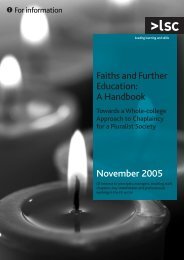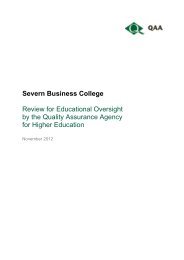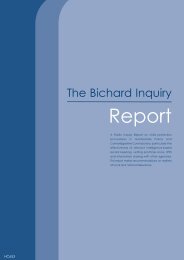The Learning and Skills Councils Annual Report and Accounts for ...
The Learning and Skills Councils Annual Report and Accounts for ...
The Learning and Skills Councils Annual Report and Accounts for ...
You also want an ePaper? Increase the reach of your titles
YUMPU automatically turns print PDFs into web optimized ePapers that Google loves.
3b Programme expenditure by regional office<br />
Year ended<br />
31 March 2010<br />
£’000<br />
Year ended<br />
31 March 2009<br />
£’000<br />
Region<br />
East of Engl<strong>and</strong> 1,238,653 1,142,084<br />
East Midl<strong>and</strong>s 1,060,105 982,607<br />
Greater London 2,121,258 1,966,508<br />
North East 765,033 710,177<br />
North West 1,834,347 1,685,784<br />
South East 1,869,765 1,789,005<br />
South West 1,183,523 1,073,507<br />
West Midl<strong>and</strong>s 1,609,854 1,382,545<br />
Yorkshire <strong>and</strong> the Humber 1,260,974 1,139,728<br />
Total programme expenditure by region 12,943,512 11,871,945<br />
4 Assurances on<br />
entitlement to, <strong>and</strong> the<br />
proper use of, LSC funds<br />
In order to gain assurance over the<br />
proper use of public funds by learning<br />
providers, the LSC established regional<br />
<strong>and</strong> national office audit teams within<br />
the Provider Financial Management<br />
function. As set out in the Accounting<br />
Officer’s Statement on Internal<br />
Control, the national <strong>and</strong> regional<br />
audit teams were responsible <strong>for</strong><br />
planning, co-ordinating <strong>and</strong> delivering<br />
a programme of work to secure this<br />
assurance. <strong>The</strong> outcomes of audit<br />
work were scrutinised by regional <strong>and</strong><br />
national LSC audit committees.<br />
<strong>The</strong> approaches used to obtain<br />
assurance depended on the risks<br />
associated with providers <strong>and</strong> funding<br />
streams, <strong>and</strong> were designed to<br />
minimise bureaucracy on providers. In<br />
broad terms, where grant funding is<br />
provided to other public bodies such<br />
as FE colleges, the LSC relied on audit<br />
work carried out by the public bodies’<br />
auditors, working to an audit code of<br />
practice <strong>and</strong> st<strong>and</strong>ards set by the LSC.<br />
For private sector <strong>and</strong> other training<br />
providers funded under contract, the<br />
LSC’s national <strong>and</strong> regional audit<br />
teams carried out their own audit work<br />
to ensure that funds were properly<br />
applied in the delivery of those<br />
contracts.<br />
Assurance on grants<br />
Included in these financial statements<br />
are grants to further education (FE)<br />
learning providers that the LSC has<br />
paid <strong>for</strong> the academic years ending<br />
31 July 2009 (four months) <strong>and</strong><br />
31 July 2010 (eight months).<br />
<strong>The</strong> mis-match between the<br />
accounting periods means that certain<br />
<strong>for</strong>mal assurances on entitlement <strong>and</strong><br />
the proper use of the funds will only<br />
be received from these providers in<br />
line with their own annual accountsreporting<br />
timetables, which extend<br />
beyond that <strong>for</strong> these financial<br />
statements. Alternative arrangements<br />
have there<strong>for</strong>e been put in place<br />
to provide interim assurance as at<br />
31 March 2010. <strong>The</strong> overall picture is<br />
described below.<br />
4a FE colleges <strong>and</strong> other FE providers<br />
During the financial year 2009–10,<br />
the LSC paid grants of £6,050 million<br />
(2008–09: £5,379 million) to colleges<br />
<strong>and</strong> other providers of FE. With the<br />
arrival of dem<strong>and</strong>-led funding in<br />
2008–09, the LSC reintroduced a<br />
programme of funding audits at<br />
colleges based on the approach<br />
that had been in place be<strong>for</strong>e the<br />
implementation of plan-led funding in<br />
2004–05. <strong>The</strong> funding audits replaced<br />
the cyclical reviews of learner eligibility<br />
<strong>and</strong> existence. All colleges were risk<br />
assessed, <strong>and</strong> the 75 highest-risk<br />
colleges had a funding audit that<br />
was completed by outsourced audit<br />
firms in accordance with a st<strong>and</strong>ard<br />
funding audit programme. As a result<br />
of the audit work, four colleges<br />
received qualified opinions, <strong>and</strong> agreed<br />
improvement plans have been put<br />
in place to address the underlying<br />
control weaknesses at these colleges.<br />
All colleges are required to return a<br />
year-end funding claim certified by<br />
the principal.<br />
For the majority of colleges the<br />
primary sources of assurance <strong>for</strong> the<br />
LSC’s 2009–10 financial statements<br />
are the audit opinion on their own<br />
financial statements <strong>for</strong> the academic<br />
year ended 31 July 2009 <strong>and</strong> the<br />
regularity audit opinion. <strong>The</strong> regularity<br />
audit at colleges took place alongside<br />
the financial statements audit. Colleges<br />
provided the LSC with an audited<br />
statement on regularity, propriety <strong>and</strong><br />
compliance, signed by the chair <strong>and</strong><br />
principal on behalf of the governing<br />
body. As a result of the regularity audit<br />
work, three colleges received qualified<br />
opinions, but both cases related to<br />
isolated incidents, <strong>and</strong> there are no<br />
underlying concerns.<br />
<strong>The</strong> position in respect of the<br />
2008–09 academic year is shown<br />
in Table 3.<br />
60 LSC <strong>Annual</strong> <strong>Report</strong> <strong>and</strong> <strong>Accounts</strong> 2009–10



